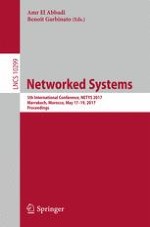2017 | OriginalPaper | Buchkapitel
Incoercible Fully-Remote Electronic Voting Protocol
verfasst von : Wafa Neji, Kaouther Blibech, Narjes Ben Rajeb
Erschienen in: Networked Systems
Aktivieren Sie unsere intelligente Suche, um passende Fachinhalte oder Patente zu finden.
Wählen Sie Textabschnitte aus um mit Künstlicher Intelligenz passenden Patente zu finden. powered by
Markieren Sie Textabschnitte, um KI-gestützt weitere passende Inhalte zu finden. powered by
